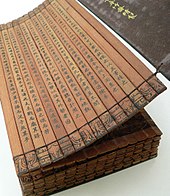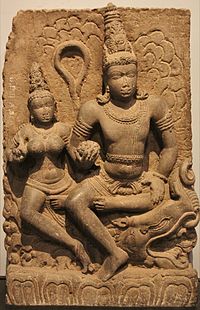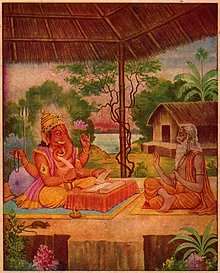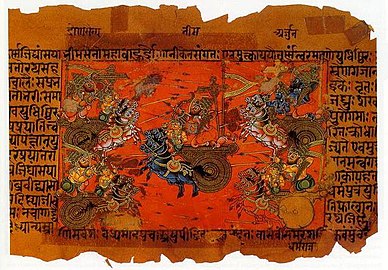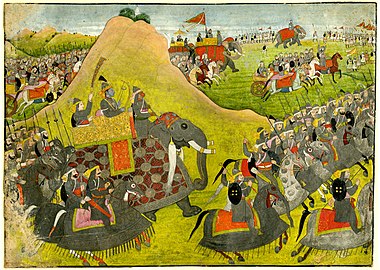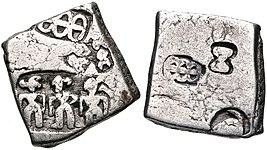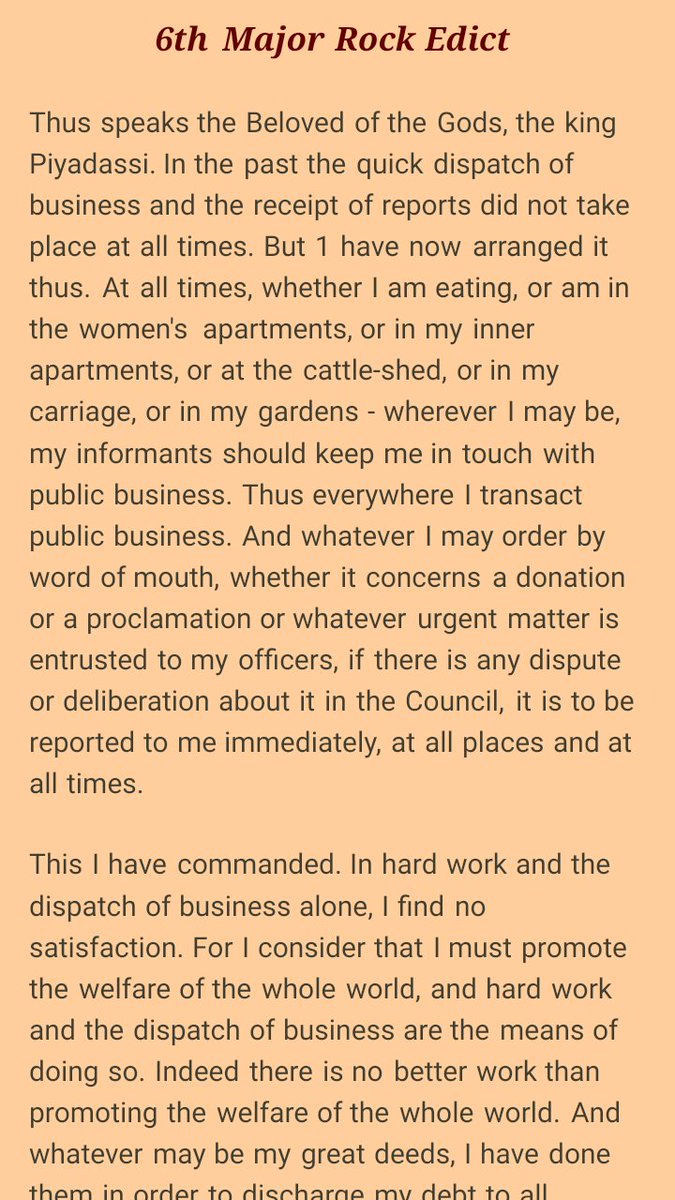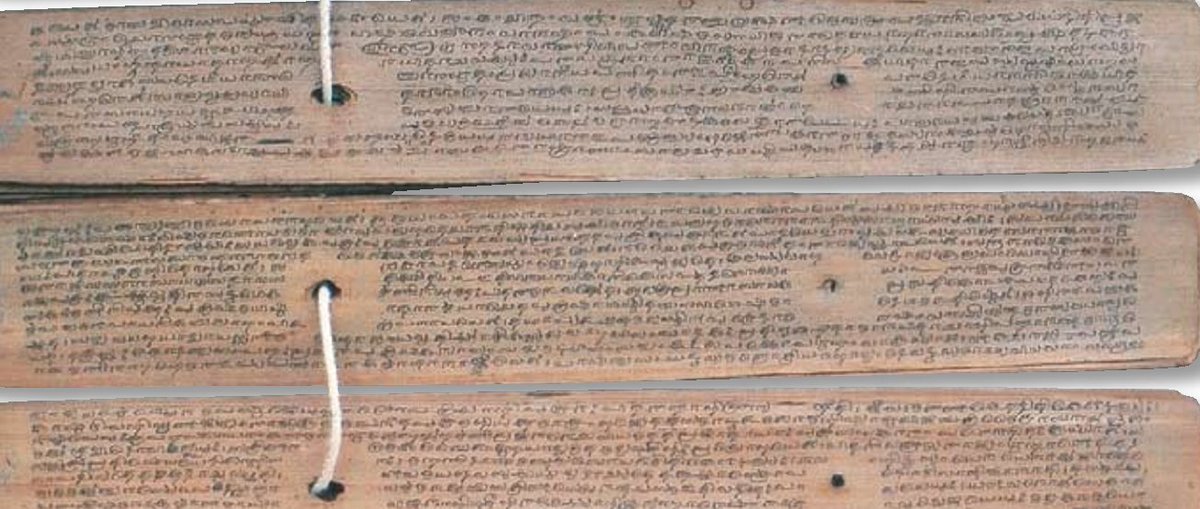Chapter 8: Military Espionage
This chapter will focus on use of espionage in the system of warfare of Ancient India.
Image of a bamboo copy of & #39;Art of War& #39; by Sun Tzu.
This chapter will focus on use of espionage in the system of warfare of Ancient India.
Image of a bamboo copy of & #39;Art of War& #39; by Sun Tzu.
Spies filled an important role in both the civil & military affairs of ancient India. They are mentioned in the Vedas.
The Rig Veda speaks of spies ( spasah) of Varuna. They sit down around him ( I. 24, 13); they behold the two worlds ( VIII. 87, 13); they are undeceived & wise.
The Rig Veda speaks of spies ( spasah) of Varuna. They sit down around him ( I. 24, 13); they behold the two worlds ( VIII. 87, 13); they are undeceived & wise.
In the Athar Veda ( VI. 16.4), it is staed that Varuna& #39;s spies descended from heaven , to traverse the world: " thousand eyed, they took over the earth."
Image of Varuna with Varunani at Chatrapati Shivaji Maharaj Museum, Mumbai.
Image of Varuna with Varunani at Chatrapati Shivaji Maharaj Museum, Mumbai.
Besides, Varuna& #39;s spies are also attributed to Mithira ( VIII. 61,3), to Agni ( VI. 4,3), to Soma ( IX. 73,4,7), to demons combated by Indra (I.33,8), and to the gods in general ( X.10,8).
Manu speaks of 5 classes of spies ( IX, 201). They were to :
1) detect crime ( IX, 201);
2) to keep a watch on officials (VII, 122); and
3) Constantly ascertain the King and his enemies strength (IX, 298).
1) detect crime ( IX, 201);
2) to keep a watch on officials (VII, 122); and
3) Constantly ascertain the King and his enemies strength (IX, 298).
In military affairs, the spies had an important role. In the Udyog Parva of Mahabharata (33,34) it is stated that " cows see by smell, priests by knowledge, kings by spies, and other men through eyes."
Image of Ganesha writing the Mahabharata.
Image of Ganesha writing the Mahabharata.
In the war scenes of Mahabharata, spies are taken as forming part of the camp. They are frequently sent from one side to another to gauge the strength of the enemy.
Image of a battle scene from Mahabharata
Image of a battle scene from Mahabharata
In the Udyog Parva ( 196,2), Yudhistara says: " The spies I had placed in the army of Duryodhana, bought me news in the morning."
Similarly, the news of Arjuna& #39;s vow to kill Jayadratha, was carried across by the spies placed by Duryodhana ( Drona Parva 74, 1).
Similarly, the news of Arjuna& #39;s vow to kill Jayadratha, was carried across by the spies placed by Duryodhana ( Drona Parva 74, 1).
In Ramayana, Ravana frequently sends spies to the opposition camp to discover the exact military resources and plans of the enemy.
Image of a scene from Ramayana.
Image of a scene from Ramayana.
During the Mauryan period, a complete system of espionage was established in the country. Arrian refers to a class of men called & #39; Overseers& #39; ( Epsikopoi) who " overlook what is done through the country & cities, & make report to the king."
Image of a coin of Mauryan Empire.
Image of a coin of Mauryan Empire.
Strabo calls this class of men as & #39; Ephori& #39; or inspectors. He says : " They are entrusted with the super- intendence of all that is going on & it is their duty to report privately to the king."
It is very interesting to note that the number of spies were so large that Megasthenes was mislead into thinking that the spies constituted one of the seven classes of the Indian people.
Image of a Mauryan coin, 4th century BCE.
Image of a Mauryan coin, 4th century BCE.
Reporters of Ashoka :
Ashoka, in one of his inscriptions Rock Edict VI, refers to officers whom he calls & #39; Prativedakas& #39; whose duty was to report to him to whom they had free access, at all hours & places, on what was going on in the country ( athe me janasya pativedtha iti).
Ashoka, in one of his inscriptions Rock Edict VI, refers to officers whom he calls & #39; Prativedakas& #39; whose duty was to report to him to whom they had free access, at all hours & places, on what was going on in the country ( athe me janasya pativedtha iti).
Detectives:
Detectives were liberally employed for the purpose of preventing & tracing crime.
They were recruited from all classes of people in the country such as ascetics, jugglers, bards, fortune-tellers, physicians, musicians, etc.
Detectives were liberally employed for the purpose of preventing & tracing crime.
They were recruited from all classes of people in the country such as ascetics, jugglers, bards, fortune-tellers, physicians, musicians, etc.
If a person is suspected of criminal conduct, a suitable spy would be told to shadow him.
Some of the spies were employed to incite crime. They watched the suspects of the country and incited them to do the crime, which they were prone to.
Some of the spies were employed to incite crime. They watched the suspects of the country and incited them to do the crime, which they were prone to.
If it was a judge ( Dharmastha or Pradestha), he would be tempted by over of a bribe and convicted as an & #39;upadagrahaka& #39;.
If it was a village headman ( grama-kula), or a magistrate ( Adhyaksha), he was incited to extort rich citizens & punished as an & #39; utkochaka& #39;.
If it was a village headman ( grama-kula), or a magistrate ( Adhyaksha), he was incited to extort rich citizens & punished as an & #39; utkochaka& #39;.
Or a person might be bribed to give false evidence, or poison people, or procure or corrupt women by charms & incantations, and be convicted as a & #39;kuta -sakshi& #39; , a & #39;Rasada& #39; or & #39;krityabhichara-sila& #39;.
Or a spy may act as an apprentice in the service of a man suspected of manufacture counterfeit coins, & if it is found to be true, that man would be convicted and banished as & #39; kuta - rupa - karaka& #39; or & #39; kuta-suvarna- vyavahari& #39;.
Young men given to robbery & adultery would also be entrapped by spies enrolling themselves as members of their gang whom they would lead to a village & into its marked house, by a pre-arranged plan & to commit their crimes.
In Arthashastra ( Book IV, chapter 4, 5), Kautilya tells of detectives masquerading as brigands, going among criminals, & instigating them to attack caravans or village goods.
Images of the original copy of Arthashastra, at Mysore Oriental Research Institute.
Images of the original copy of Arthashastra, at Mysore Oriental Research Institute.
As the attack takes place, the assailants may be slain by armed forces posted there in advance, or they may be arrested while sleeping in intoxication from the effects of drugged food or drinks provided for them.
In Book 5, Chapter 3, Kautilya provides a payment of 1,000 panas to the Spies of different classes during the performance of Rajasuya Yagya by the King.
Broadly speaking, in relation to foreign states espionage took three forms : Political, diplomatic and military.
The first, involved an attempt to get in touch with discontented elements in a hostile state and to utilize their services in the destruction of their own country !
The first, involved an attempt to get in touch with discontented elements in a hostile state and to utilize their services in the destruction of their own country !
Many kinds of political espionage has been described by Chanakya in his Arthashastra in Book 1, chapter 14, Book VII and Book VIII.
Diplomatic espionage was carried out by the Ambassadors & other diplomatic agents in foreign countries.
Diplomatic espionage was carried out by the Ambassadors & other diplomatic agents in foreign countries.
The duties of these officers included not only negotiations, but also an observation on what goes on in the country to which they have been accredited.
They were expected to keep an eye on all matters which directly or indirectly affected the interests their home country.
They were expected to keep an eye on all matters which directly or indirectly affected the interests their home country.
Department of Embassies : Book 1, Chapter 16, Arthashastra.
The Mauryan Empire maintained a Department of Embassies in charge of its foreign relations. Ambassadors or & #39; Dutas& #39; were recruited from Ministers ( Amatyas of full qualification) & were of different grades.
The Mauryan Empire maintained a Department of Embassies in charge of its foreign relations. Ambassadors or & #39; Dutas& #39; were recruited from Ministers ( Amatyas of full qualification) & were of different grades.
These grades were :
1) Nisrishatartha,
2) Parimitartha, or an envoy charged with limited mission ; and
3) Sasana- hara, an instructed emissary: the bearer of Royal decrees
1) Nisrishatartha,
2) Parimitartha, or an envoy charged with limited mission ; and
3) Sasana- hara, an instructed emissary: the bearer of Royal decrees
The Ambassador was deputed to foreign States with due pomp & equipment as regards conveyance ( yana), horses & other animals as vehicles ( Vahana), retainers ( purusha) & provisions for food and rest ( parivapa) suitable for each journey.
The Ambassador or & #39;Duta& #39; is described as the mouthpiece of the king ( Dutamukkah rajanah).
He must know how to behave in a foreign country.
He must not be impatient but stay on till his mission is over and is asked to leave ( vasedavisrishtah).
He must know how to behave in a foreign country.
He must not be impatient but stay on till his mission is over and is asked to leave ( vasedavisrishtah).
An Ambassador must not be affected by honours shown to him ( pujaya notsiktah).
He must live a strictly moral life, abstaining from wine & women ( striyah pranam cha varjayet).
He must live a strictly moral life, abstaining from wine & women ( striyah pranam cha varjayet).
He is charged with duties of great importance like:
delivery of king& #39;s message, maintenance of treaties ( sandhipalatvam), issue of ultimatum ( pratapa), acquisition of allies ( Mitra - sagraha), political intrigue (upajapa) , breaking enemies alliances ( suhrid-bheda), etc.
delivery of king& #39;s message, maintenance of treaties ( sandhipalatvam), issue of ultimatum ( pratapa), acquisition of allies ( Mitra - sagraha), political intrigue (upajapa) , breaking enemies alliances ( suhrid-bheda), etc.
Military espionage consisted in the employment of secret agents to procure accurate information regarding the military resources of the hostile states, plans and movements of the hostile army & safe-guarding one& #39;s own camp from enemy designs.
In Book 12, Chapter 4 of Arthashastra, Kautilya speaks of " spies residing as traders, farmers, cow- herds, or ascetics in the district borders of enemy country."
Further, Kautilya advocates the employment of spies along with the marching army, in the camp & also in the fighting line.
The spies should demoralise the enemy king by creating dissensions within his army by false propaganda or fake information.
The spies should demoralise the enemy king by creating dissensions within his army by false propaganda or fake information.
In capturing a fort Kautilya, advises the invading king to infuse enthusiastic spirit among his own men and frighten the enemy king by giving publicity to his awesome power and close association with the Gods.
Treatment of Spies Caught:
Normally, the spies who were not careful, or were double-crossed by his acquaintance in the enemy country, were executed if caught.
However, in some instances the spies were sent back to their home country/ camp.
Normally, the spies who were not careful, or were double-crossed by his acquaintance in the enemy country, were executed if caught.
However, in some instances the spies were sent back to their home country/ camp.
In Ramayana, when Ravana sent his spies to the enemy camp, they were caught and brought to Rama for judgement.
However, Rama forgave them and they were sent back to their camp, with their honour restored.
However, Rama forgave them and they were sent back to their camp, with their honour restored.
In political and diplomatic Espionage, the diplomat had special rights.
They were not to be abused, tortured or to be put to death. It was a & #39;rule of thumb& #39; all over the world, where diplomats or & #39;Dutas& #39; were sent back, without any harm being done to them.
They were not to be abused, tortured or to be put to death. It was a & #39;rule of thumb& #39; all over the world, where diplomats or & #39;Dutas& #39; were sent back, without any harm being done to them.
We hear of Ravana threatening to kill Hanuman, however on being reminded of the special status of an Ambassador, he relented.
Similarly, Duryodhana tried to capture Krishna, who was an ambassador of the Pandavas.
Similarly, Duryodhana tried to capture Krishna, who was an ambassador of the Pandavas.
Killing of & #39;Dutas& #39; or Ambassadors would normally result in war.
As the Ambassador was the mouthpiece of the State and the King, any harm done to him will automatically mean that the King has been insulted.
As the Ambassador was the mouthpiece of the State and the King, any harm done to him will automatically mean that the King has been insulted.
A famous example is the Khwarzam Governor, who in 1219 killed some diplomats of Ghenghis Khan.
Genghis sent another group of diplomats to Khwarzam Shah to remonstrate about the behavior of his governor but these were also executed
The result was that Mongols destroyed Khwarzam.
Genghis sent another group of diplomats to Khwarzam Shah to remonstrate about the behavior of his governor but these were also executed
The result was that Mongols destroyed Khwarzam.
@threadreaderapp , unroll

 Read on Twitter
Read on Twitter